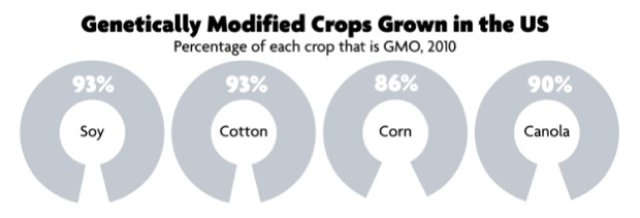https://www.scientificamerican.com/a..._HLTH_20121113
In the end, the public was swayed by the No on Prop 37 campaign, which convinced people that the economic costs were too high and the science didn't make sense. As of November 6, Prop 37 is dead. The deck was stacked against the pro-Prop 37 camp, funded by companies like Nature's Path Foods and Amy's Kitchen, from the start. It just wasn't as well-funded; the No on Prop 37 movement saw pesticide companies like Monsanto and Bayer Cropscience sinking millions of dollars into the campaign.
In the last 20 days before the election, No on Prop 37 spent an average of over $1 million each day on an ad blitz, killing the proposition's momentum--it dropped from 67% support in September to 39% support by the election.
Genetic Engineers Explain Why Genetically Modified Food Is Dangerous | Co.Exist: World changing ideas and innovation
The authors include John Fagan, a former genetic engineer who gave back his National Institutes of Health grant money because of safety and ethical concerns (he now runs a GMO testing company); Michael Antoniou, the head of the Gene Expression and Therapy Group at King’s College London School of Medicine in London; and Claire Robinson, research director of Earth Open Source.
What are these scientists worried about?
Genetic engineering is not, as proponents claim, an extension of natural plant breeding. While natural breeding takes place only between related kinds of life, genetic engineering happens in a lab, where tissue cultured plant cells undergo a GM gene insertion process that couldn’t happen in nature. This is not in and of itself a bad thing.
One of the problems, say the researchers, is that genetic engineering is imprecise and the results are unpredictable, with mutations changing the nutritional content of food, crop performance, and toxic effects, among other things. Every generation of GMO crops interacts with more organisms, creating more opportunities for unwanted side effects.
GMO technology is becoming more precise, but the authors contend that accidents will always happen and, in any case, plant biotechnologists don’t really know much at all about crop genomes--so inserting genes at a supposedly safe area could still lead to all sorts of side effects.
GMO crops can be toxic in three ways: The genetically modified gene itself (i.e. Bt toxin in insecticidal crops); mutagenic or gene regulatory effects created by the GMO transformation process; and toxic residues created by farming practices (i.e. from the Roundup herbicide used on GMO Roundup Ready crops).
GMO food regulation varies widely by country. In the U.S., the FDA doesn’t have a required GMO food safety assessment process--just a voluntary program for review of GMO foods before they go on the market (not all commercialized GMO food crops have done this).
Independent GMO crop risk research is hard to come by because, as the report explains, "independent research on GM crop risks is not supported financially--and because industry uses its patent-based control of GM crops to restrict independent research. Research that has been suppressed includes assessments of health and environmental safety and agronomic performance of GM crops." A 2010 licensing agreement between Monsanto and USDA scientists should make it easier to conduct research--but the report explains that it’s still restrictive.
The Genetically Modified Food You Eat Every Day | Co.Exist: World changing ideas and innovation
To avoid most GMOs...at this point...avoid these foods...if you can?
 About the only way to do this is to avoid most processed foods.
About the only way to do this is to avoid most processed foods.  REMEMBER: if you don't care...I'm pretty sure I don't care. We makes our choices and we takes our chances.
REMEMBER: if you don't care...I'm pretty sure I don't care. We makes our choices and we takes our chances.
...